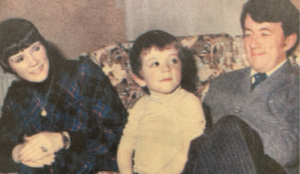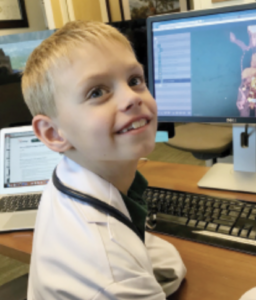NET patient, oncologist, and NETRF Board Member Mark Lewis, MD, is a native Scotsman who moved to Austin, TX as a young man when his dad accepted a job as a professor at the University of Texas at Austin; that move across the pond to central Texas was the beginning of Mark’s and his family’s lifelong journey with neuroendocrine cancer.
“Essentially, my dad had to pass a physical to immigrate to the States, and the standard chest x-ray performed to rule out tuberculosis showed that Dad had a tumor in his lung,” explains Mark.
“He was basically asymptomatic. For years, my father labored under the misapprehension that he had ‘lung cancer’ because that’s the phrase that was used, and in fact not only was it neuroendocrine, it didn’t even technically start in his lung. It took me years to realize the cancer originated in his thymus, which is really annoying because that’s an organ that basically stops being useful to us around age 30, so a truly ‘vestigial organ’ was the source of my dad’s lethal cancer.”
“My dad was diagnosed in 1987, which seems like a lifetime ago in terms of NET care. I often think I would really love to tell him it wasn’t his fault. He went to his grave thinking he had done something wrong; I think the whole ‘lung cancer’ thing really weighed on him, and lung cancer is so stigmatized. My father never smoked, but he always lamented, ‘Well, gosh, maybe I could have been more careful about secondhand smoke exposure,’ and he was really hard on himself. He had no clue this cancer was hereditary,” says Mark.
It would be a few years after his father’s death that Mark would eventually solve the puzzle of his Dad’s rare cancer and discover that his paternal grandfather had died from an unusual and unidentified cancer, while his paternal uncle would succumb to cancer caused by a rare pituitary tumor.
 Mark, with his mom and dad
Mark, with his mom and dad
“I was a freshman in high school when Dad died, and I was a very angry teenager. It seemed so unfair. And so, my new mantra became “Oh, I’m going to avenge him. Cancer is my enemy now.” But the real gamechanger was my dad’s oncologist, whom I am still in touch with to this day. One day he said to me ‘You seem interested in science ’ (which in code I think he meant ‘you seem like a real nerd…’) but in fairness, he did something amazing for me, which I try to do now, is he let me come and chat with him in clinic; so for basically most of high school, whenever I asked and he had the latitude to do so, I got to follow him around…and that’s how I got into oncology.”
Physician, heal thyself
“Fast forward to medical school, on my first day of my fellowship I diagnosed myself! Basically, I always had some chronic abdominal pain but it became acute on day one of my fellowship. I thought it was appendicitis, but it wasn’t – the pain was due from a high calcium levels, and that was my eureka moment because my father struggled with high calcium his whole life and had horrendous trouble with kidney stones.”
“At that point in my training, I knew just enough. I knew there were two hereditary conditions that would cause consecutive generations to have a high and otherwise unexplained calcium; one is entirely benign, called familial hypocalciuric hypercalcemia, and the other one is MEN1 (A rare, inherited disorder that affects the endocrine glands and can cause tumors in the parathyroid, pituitary glands and pancreas). And that’s when I was like, ‘Oh my gosh. This is oncologic.’ My dad died of cancer, my uncle died of cancer, and my paternal grandfather died of cancer. So I went to my internist who promptly diagnosed me as being a hypochondriac, and I don’t blame him, but I was persistent and got the tests that I needed; I had my calcium rechecked with my parathyroid hormone output and when the results came back, he said, ‘Well, actually, you were right.’”
NET Patient & NET Physician
“As a patient and an oncologist, I view NETs in a way that a lot of my colleagues can’t, which is from the patient’s perspective. I hear colleagues say something they think is innocuous, like ‘but it’s a good cancer…’ I’m not really sure there is such a thing. There are certainly more favorable cancers in terms of prognosis, but it does kind of boil my blood when I hear that, and I feel the same way about the phrase manageable toxicity, which I hear quite a lot at conferences. And that drives me crazy because often they’re trying to explain away some horrendous side effect. So that’s been very instructive for me as a practitioner and I have patients who have explicitly told me, “I only came to you because you seem like you get it.” And I think that’s amazing. In the modern era, if you’ve got the right resources, some of these people could go literally anywhere, and they want a doctor who has had cancer. That’s what they want.”
A father of two, Mark and his wife opted to have both their children tested for MEN1.
“Emma does not have the condition but my son Alan, named for my dad, does carry the mutation. Alan was born in 2011 and by this time I knew I carried the gene, and for my wife and me, knowledge is power, and we know what to be on the lookout for.”
 Mark’s son, Alan, named for his beloved dad
Mark’s son, Alan, named for his beloved dad
Working with the NETRF Board of Directors
“My work with NETRF has been so rewarding, and educational! One of the aspects that I really like about working with the board is the diversity of the members; I think NETRF has convened an incredible brain trust, and it’s actually really nice to be in a group with people that aren’t strictly medical professionals, because the way they look at things, especially when it comes to financial stewardship, is incredibly necessary, and for me, very instructive.”
“I have actually changed the way I consider grant proposals – I used to live in a sort of fantasy world where they were all just judged on pure scientific merit and that was it, but I am very aware, especially as a NETRF donor, that this money really matters. People donate money, no matter how much, because they’re trying to push the field forward. And the only way we can do that is by being very supportive of research efforts but also selective of who gets that money. And that’s probably the number one thing the board has taught me, especially the board colleagues who are very successful entrepreneurs.”
What’s next?
Mark is currently writing a book about his experiences as a cancer patient and a cancer physician.
“My dad was an author, and he was writing a book when he was dying from cancer, and in a way, it was his legacy-in-ink. I’ve given myself till my next birthday (August) to finish!
Mark A. Lewis, MD practices gastrointestinal oncology at Intermountain Health in Murray, UT.
Follow him on Twitter at @marklewismd
